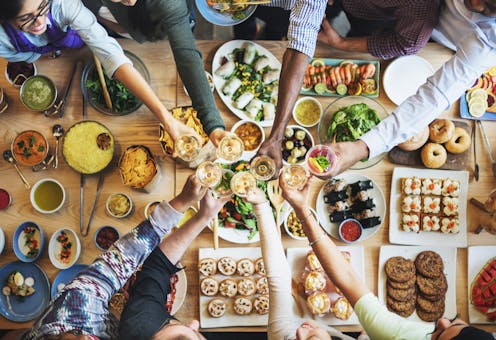Why eating at work is important – even the odd slice of cake
- Written by Martin Caraher, Professor of Food and Health Policy, City, University of London

When England’s Food Standards Agency boss Susan Jebb recently compared eating cake at work to passive smoking, office cubicle walls across the land quivered. She told The Times[1]:
If nobody brought in cakes into the office, I would not eat cakes in the day, but because people do bring cakes in, I eat them. Now, OK, I have made a choice, but people were making a choice to go into a smoky pub.
Professor Jebb is right to criticise unstructured eating in the workplace, which can contribute to unhealthy eating. Over-consumption of unhealthy produce such as cakes and processed foods can of course contribute to dietary issues[2] including obesity and coronary heart disease. But this should be balanced against the social impact and positive effects of bringing food into the workplace.
When colleagues bake cakes or biscuits and share them, it no doubt boosts both the giver and the receiver. Employees in Sweden seem to believe this is true: Fika is a daily social event[3] based around sharing food at work – mainly cakes and other sweet dishes. But Fika involves taking time away from the desktop or workbench to engage with colleagues over food. Eating together like this has been shown to have benefits[4] ranging from more positive feelings about the workplace and better mental health to improved team working.
Let them eat cake
Indeed, much of the discussion in the wake of Jebb’s comments has focused on people’s inability to resist eating cake or biscuits that have been left out. This is possibly more of a danger when people set up cake or snack desks or areas and simply leave food there for people to help themselves throughout the day.
And employees also face other food-related pressures that should be more of a priority for governments and companies. Some research shows staff are often too stressed[5] to take time to make healthy food choices at work. One way of stopping this is to ensure that there are options for staff to eat while at work[6], either on-site or through off-site provision.
The UK has a history of “workers’ canteens” originating during the second world war[8] when it was compulsory for businesses employing more than 250 people to have somewhere for everyone to eat. In the 1950s, canteens in the workplace started to become less popular, often due to changing tastes, negative experiences of past “institutional catering”, lack of choice, as well as the loss of government subsidies.
Ticket restaurants no longer exist in the UK, where they originated[9], but such schemes still operate in 50 countries worldwide. This kind of initiative works well for places of employment without a canteen or designated eating area. Some governments even recognise it as a tax-deductible benefit so employers can claim a tax reduction for the provision of the voucher.
Eating at your desk
In many countries, including the UK, workplace eating habits have also changed over time. Fewer people now take an hour-long lunch break. A 2021 survey of 133 UK companies found that 6% of workers in the UK regularly skip lunch[10]. And as the British entrepreneur Alan Sugar reportedly said[11] when discussing employee eating habits at his computer company, as far back as 1987:
At Amstrad the staff start early and finish late. Nobody takes lunches – they may get a sandwich slung on their desk.
But workplace eating is actually important for productivity, if properly balanced. When the International Labour Organization (ILO) analysed eating habits worldwide in 2005, it found that a poor or excessive diet in the workplace could decrease productivity by 20%[12]. It also identified the importance of vouchers as offering social benefits to employees and financial support to local economies.
References
- ^ The Times (www.thetimes.co.uk)
- ^ contribute to dietary issues (www.nih.gov)
- ^ Fika is a daily social event (www.bbc.com)
- ^ has been shown to have benefits (pubmed.ncbi.nlm.nih.gov)
- ^ staff are often too stressed (www.ceo-review.com)
- ^ options for staff to eat while at work (www.ncbi.nlm.nih.gov)
- ^ Altrendo Images/Shutterstock (www.shutterstock.com)
- ^ originating during the second world war (www.bitebackpublishing.com)
- ^ where they originated (medcraveonline.com)
- ^ 6% of workers in the UK regularly skip lunch (www.communicatemagazine.com)
- ^ reportedly said (www.theguardian.com)
- ^ decrease productivity by 20% (www.ilo.org)
- ^ Chaay_Tee/Shutterstock (www.shutterstock.com)
- ^ the rising cost of doing business (www.bbc.co.uk)
- ^ a perk for highly paid tech workers (tech.co)
- ^ with food price inflation currently at 16% (www.ons.gov.uk)
Read more https://theconversation.com/why-eating-at-work-is-important-even-the-odd-slice-of-cake-198207







